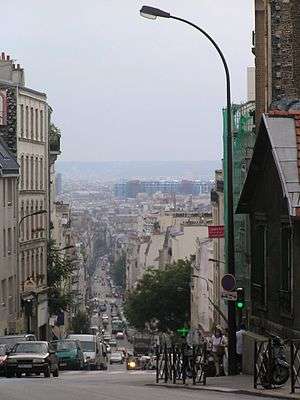Ménilmontant
Ménilmontant (French pronunciation: [menilmɔ̃tɑ̃]) is a neighbourhood of Paris, situated in the city's 20th arrondissement. It is affectionately known to locals as "Ménilmuche".

History
Originally a hamlet within the independent commune (municipality) of Belleville, Ménilmontant was, like other suburban communes surrounding the French capital, absorbed into the city of Paris in 1860. The name is said to derive from Mesnil Mautemps, meaning "bad weather house". By the 16th century mautemps had been corrupted into montant (meaning "climbing"), probably owing to its situation on a hill overlooking Paris.
In 1832, the area also served as the location of a retreat, established by the Saint-Simonian theorist Enfantin and forty followers. Before its 1860 absorption into Paris, Ménilmontant lay beyond the capital's tax border (octroi), so that wine was cheaper there, leading to the development of numerous drinking establishments, known as guinguettes, in the 18th century. It has long been a predominantly working-class neighborhood, and in the early 1830s became notorious for the commune established there by the Saint-Simonians before being banned by the authorities.
Transport
Ménilmontant is served by the Ménilmontant station of the Métro.
In popular culture
Literature
- Menilmontant is the scene of the first part of Russian-born Andrei Makine's novel La vie d'un homme inconnu.
- The Prix Goncourt winning novel La Maternelle (1904) takes place in Ménilmontant.[1]
- The Ménilmontant neighbourhood is mentioned prominently in Henry Miller's 1956 novel Quiet Days in Clichy as well as in the 1969 film adaptation of that novel by Jens Jørgen Thorsen.
Singing
- Film star and singer Maurice Chevalier was born in Ménilmontant.[2]
- Ménilmontant is a song by the French singer Charles Trenet. An instrumental version was recorded by Django Reinhardt in 1949/50.
- "Rue de Ménilmontant" is a song by the French singer Camille Dalmais.
Cinema
- Ménilmontant is a 1926 film written and directed by Dimitri Kirsanoff, which takes its name from the Ménilmontant.
- The character Garance, in the classic French film Les Enfants du Paradis (1945), hails from Ménilmontant.
- Ménilmontant is the setting of Casque d'or (1952), starring Simone Signoret.
- The Palme d'Or-winning classic fantasy short film Le Ballon Rouge (1956) was set all around Ménilmontant.
- The chase scene in the 2002 film The Bourne Identity, where Franka Potente and Matt Damon tear around Paris in a Mini, was filmed partly in Ménilmontant.
- The crime drama movie Un p'tit gars de Ménilmontant (2013) by Alain Minier takes place here.
References
- Albert Schinz, "Acadamie Goncourt and its Laureate Leon Frapie" in The Bookman, Vol. 21, p. 290. Dodd, Mead and Co., 1905.
- Huang, H., Music in the 20th Century, vol. 1 (Armonk, New York: M. E. Sharpe, 1999), p.124.